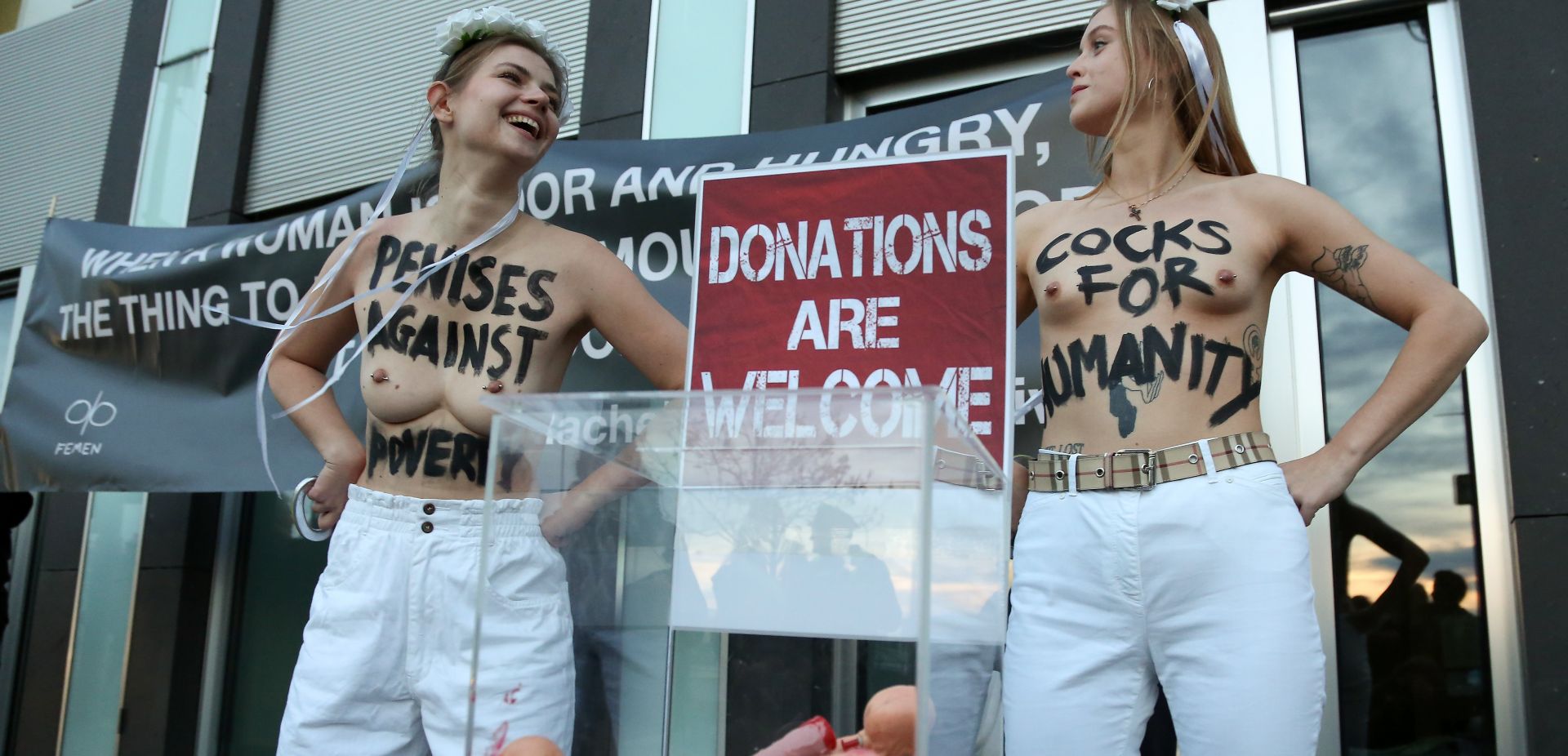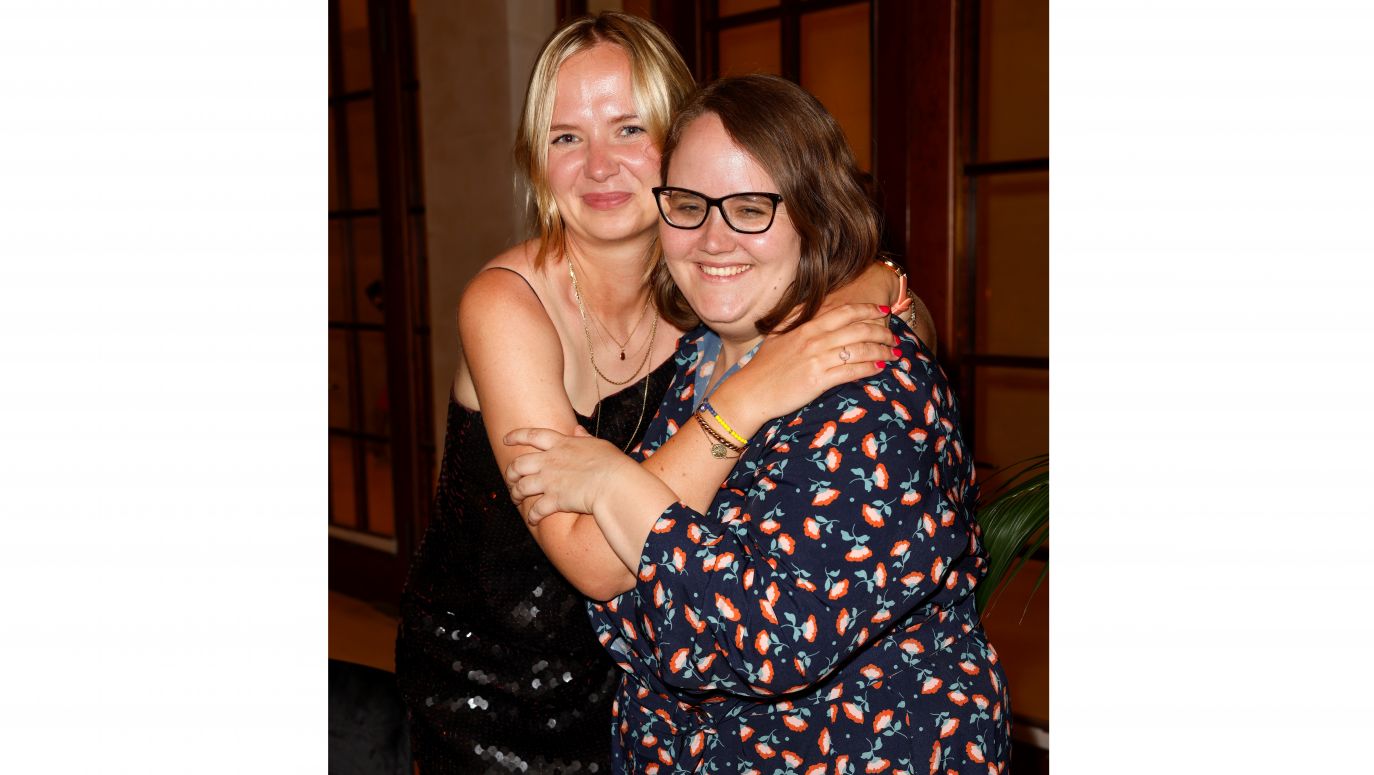Please don't giggle. A feminist foreign policy is coming
28.12.2022
What is 'patriarchal' is bad. And even Putin is not bad because he is restoring the Soviet Union and rebuilding the empire, but he is bad because his regime is 'patriarchal'.
Annalena Baerbock says not to laugh. Or rather, not to giggle. This is a very skilful way of putting the issue. Laughing at an idea can violate it. For laughter is a healthy and natural thing. If an idea provokes laughter, there may be something wrong with it. After all, the outburst of laughter has plunged many a politician.
What is different is the giggle. The giggle is involuntary and somewhat embarrassing. In the old days, when they still existed, giggling was done by boarding schoolgirls, creatures who were inherently flippant and knew little about the world. There are no longer any boarding schools, but the connotation of giggling as an activity that reflects badly on the giggler himself rather than on the object of his giggling remains. This is why Annalena Baerbock tells us not to giggle. And she looks serious from the screen from which she is giving her speech. Because the feminist foreign policy (FFP) that Germany is now trying to adopt is a serious matter.
It's mid-September, the war in Ukraine has been going on for 200 days, the Russians have just fired on their own captives to accuse Ukraine of war crimes. The German Chancellor still refuses to deliver tanks, everyone is talking about solidarity, and an international conference on Feminist Foreign Policy is underway in Berlin.
What is it? In a nutshell, it's a new approach to foreign policy that we are led to believe will sweep across the liberal-democratic world in the coming decades, so for that reason alone we should know something about it. The name sounds a bit bizarre to an ear unaccustomed to combining distant concepts. But the unstoppable progress that is engulfing us is making us get used to it.
The easiest thing to do, of course, is always to say what feminist foreign policy is not. If only to stop laughing - pardon! - giggle. Well, it is not - as its proponents claim - the realisation that all evil in politics is the domain of men, while only women bring order and peace.
This was written by three authors involved in political analysis at the German think tank DGAP, which prides itself on its independence, but as it is largely funded by several ministries, so it can be assumed with a high degree of certainty that the views expressed in its publications are not quite so private.
The three of them dressed up their text in the interesting costume of a draft speech for Annalena Baerbock responding to Emmanuel Macron's speech at the closing of the famous Conference on the Future of Europe, which was intended to give a strong impetus to the federalisation of the Union. I have not heard anyone officially denying the theses in this text, it is still available on the DGAP website, so it is fair to believe that it does not contain anything that contradicts the official German approach to the matter.
By stating that the FFP is not about the elevation of women, the authors of the text have tried to wrestle out of the hands of possible opponents a common-sense argument that could boil down to listing women in high positions in the past who, to put it mildly, did not show a peaceful attitude towards the world, whether it was a world of women or men. That's easy enough and you don't even have to go as far back as Elizabeth I, although you could.
Of course, the word 'feminism' in the name must mean that countries adopting such policies as their compass must advocate gender equality. But has anyone met a contemporary democratic politician who does not advocate gender parity? And for equality?
We are not talking about politicians in Iran, but in Western countries. Even Donald Trump, otherwise working hard to be known as a 'male chauvinist pig' headed an administration that had equality between men and women on its banners. So what is the point? What is the deal with feminism in foreign policy?
We already know that we are not in danger of following in the tradition of Elizabeth Bathory, an otherwise excellent administrator, so we can focus on what this policy is. Oh, before we begin, it is important to mention that this is not about a complete renunciation of the use of military force, although it cannot be relied upon exclusively. Very right! It is impossible to disagree! At the level of cliches, we are fully satisfied.
Our goal is human
But enough of the negative terms, let's focus on the positives. And let's give voice to the German foreign minister as presented by a trio of her self-proclaimed ghostwriters: "Feminist foreign policy is a commitment to building just, inclusive and sustainable political structures and fostering resilience in societies in order to achieve lasting peace. It means reforming structures that have so far succumbed to the loudest and strongest.”
The reader of the speech is again somewhat confused. After all, justice, inclusiveness, sustainability or peace are all the bread and butter of political speeches. It is a kind of newspeak, or perhaps it would be nicer to say, a costume that modern European politicians are obliged to wear. I don't think any of us has met a politician in our lives who has not advocated peace, have we? Not to mention something as obvious as 'inclusiveness', whatever that means. So: what is the point?
Perhaps the answer to the question at hand is provided by the second part of the German Foreign Minister's cherry-picked statement, when she says that it is a matter of "Directing attention from the security of the state apparatus to the security of the people whom states are supposed to serve. And considering the cost of action and inaction from a different perspective."
The idea is therefore, as you can read in another text, to focus on the security of people rather than states. How did German theorists manage to separate state and citizen security?
In a text of a somewhat more theoretical and systematic nature, conceived as a contribution to the creation of the German National Security Strategy, its authors write that feminist foreign policy is about 'preventing people from being endangered', 'restoring people's security' and, finally, 'ensuring people's security'. That is, all the things that the state is supposed to be concerned with.
Everything would be fine and there would be nothing unusual about it if it was about domestic politics. May it also be feminist. Here, however, feminist is foreign policy and it is supposed to be about people, not countries.
Simple? Not exactly. For it all depends on who is acting and who is the subject of that action. The acting subject, after all, has to be the state, because in the end only the state can conduct foreign policy. In this case, it is the German state.
By contrast, the object, or target, of this state's influence is to be people. To be precise: people, i.e. citizens of foreign states. To put it even more precisely: the citizens of foreign states who will be influenced by the state conducting the FFP bypassing their own state.
Whether it will do so against their state is not made clear, but let us agree that in theoretical documents such additions do not have a raison d'être, and indeed should not. Theorists should leave it to the practitioners. Needless to say, Germany has seasoned practitioners. At least as seasoned as the theoreticians... or female theoreticians.
And the latter, in the aforementioned text, writes about the reconstruction of Ukraine as follows: "The German government must draw up effective scenarios for ending the conflict and subsequently supporting reconstruction (...) based on a discrimination-sensitive and holistic analysis that includes representatives of civil society".

Many enclaves on the outskirts are reconstructions of Arab, Turkish or African villages.
see more
This means, more or less, that the reconstruction of the devastated country will be undertaken by the German Government, which will set the objectives of this reconstruction on the basis of its assessment of what is needed by Ukrainian society, i.e. the aforementioned people in danger, and everything will happen in cooperation with civil society, not with the government or the local authorities. Needless to say, who is 'civil society' will be decided by the government. And it is by no means the Ukrainian one.
Resocialisation of countries that have chosen badly
The same text also mentions that aid providers will focus on assessing how the conflict affects 'vulnerable groups' and the need to protect them, and strengthen the influence of these groups in decision-making affecting them. One gets the impression that this modus operandi has been tailored for aid in areas torn apart by civil wars, or in so-called 'failed states', where indeed aid should be targeted at people who are threatened by local warlords. However, this text concerns Ukraine, a country that is soon to become a member of the European Union.
While in failed countries this way of helping would be the only sensible one, in a country belonging to the Western community (in the broad sense), this method may simply serve to arbitrarily channel money to causes not recognised by the local government but supported by donors who will always be able to find some representatives of 'civil society' to justify their decisions.
In this way, countries aspiring to join the Union, such as Moldova or Georgia, will become objects of social engineering dressed up in lofty slogans of inclusiveness and support for the weakest. Nor can it be ruled out that the same may happen in countries that are already formally members of the Community, which - like Poland or Hungary - have had the misfortune to make the wrong political choices.
Under the banner of a feminist foreign policy, a kind of resocialisation of these countries can take place. No one doubts that there will be numerous representatives of 'civil society' who will willingly replace the elected officials of this society in order to meet a government that wishes to strengthen 'people's security' in their own country, whose security will automatically recede into the background.
Let's go back for a moment to the contrived speech we started with: "Over the last decade we have allowed autocracies to take root inside the European Union - in Hungary, and probably even in Poland." Another author writes that a "diplomatic culture of respectability" (of course, this is old-style, non-feminist diplomacy) can lead to working exclusively with local elites in a partner country, which can lead to "legitimising the violence, repression and marginalisation carried out by these elites". Similarly, as in the case of civil society, it may be the case here that we decide who the representatives of the 'autocratic elite' are.
Activist in Armani's creation
That's right. We, that is, who? Let's take a look at the most prominent representative of the intellectual trend that now pervades the liberal elites dealing with international affairs. The head of the international centre promoting the FFP, which for some reason is based in Berlin, Kristina Lunz, is a good-looking, slim 40-year-old. She looks great at the international congresses where she tirelessly spreads her message, although of course she looked her best in Armani creations when the company foundation invited her to speak about her idea.
On this occasion, the foundation dressed Ms Lunz in some well-tailored clothes made from the finest materials. In this way, she could advertise herself in opinion-forming circles (after all, Armani is not worn by just anyone), and the company could show that its clothes are not only worn by people who are filthy rich, but also by activists concerned about the fate of women from the remotest regions of the world. Such an exchange.
I decided to check what Kristina Lunz has written about Ukraine since February this year. I was not surprised that not much, as this is an issue that is quite difficult to cover in such a way as to promote the FFP. Yes, there was an attempt to make the case that women fleeing the war to countries such as Poland would not be free to have abortions, but that somehow didn't go down because, with the best intentions of activists, it was difficult to present it as anything more serious than Russian war crimes.
Kristina Lunz is good at promotion, however. It is not for nothing that she heads an international organisation that has the BMW Foundation and Open Society as sponsors. Under the hashtag #Bucha, she posted a shocking thread, which she began and ended by saying that "her heart bleeds", but in the middle of it she only addressed the fact that feminist organisations worldwide are underfunded and the German government wants to spend the astronomical sum of 100 billion euros on weapons, when this money should be given to social activists, because they are the ones who will make the world safer. And in the long term, "more guns won't make anyone safer"..
This was the only direct reference to the war in Ukraine. One can still forcefully look for some references in the posts relating to nuclear disarmament, but even there the author focused on the fact that "nuclear weapons are the ugliest form of patriarchal state coercion".
It is generally the case that what is 'patriarchal' is bad and even Putin is not so much bad for restoring the Soviet Union and rebuilding the empire, but he is bad because his regime is 'patriarchal' and the aim of the FFP is that 'patriarchal regimes such as Putin's cannot exist, including in Russia. The policy must therefore support those who want to abolish such regimes, also in Russia". That is to say, the Russian dictatorship is bad, but it is perfectly conceivable that some other government - not necessarily dictatorial - will also be bad because it is patriarchal.
Ms Lunz is a representative of the radical trend fighting for the introduction of FFP. A radically pacifist trend that fights patriarchalism and would like to end Ukraine's war with Russia by depriving Ukrainians of armaments, she also wants total nuclear disarmament regardless of the consequences. And it feels most comfortable in the countries of the Third World - pardon! - of the Global South, where it can freely implement, as it were, from the scratch, its plans to transform societies into progressive ones, where patriarchy would be banished and women would be completely emancipated, which would be expressed mainly in free access to abortion.
Germans instead of Swedes
A month or so after Annalena Baerbock warned against giggling and the participants at the Berlin gathering were busy building a Brave New World, the international FFP construction suffered a major blow. Sweden, where it all started in 2014 when Minister Margot Wallstrom announced that her country was embarking on the path of building an FFP, has moved off the path of progress under the new conservative government.
The new foreign minister Tobias Billstrom has chillingly announced that Swedes will, of course, as always, support gender parity and equal treatment, but that he does not want to name it in a special way because "labels tend to obscure the content".
The supporters of the introduction of the FFP in Germany perceived it a little as if Christopher Columbus had turned his ship around halfway to America and decided to join a Spanish monastery. However, they decided to discover a new continent on their own, and in a way felt satisfied that Germany could thus naturally take the lead in the spearhead of countries leading other progressive countries.
Julia Gantner and Leonie Stamm wrote an extensive text in which, in addition to drawing attention to the need to popularise the idea of FFP in society (60% of Germans do not know what it is!), they noted with satisfaction that, with the reactionary Swedish government gone from the feminist foreign scene, the world is now looking at whom? On Germany, of course!




 SIGN UP TO OUR PAGE
SIGN UP TO OUR PAGE
 One could also have mentioned 'Zeitenwende', as this is now the journalistic equivalent of the obligatory quotation from Lenin in scholarly works from times justly past, and ended with the hopeful sentence that "By formulating feminist foreign policy guidelines, Germany should meet these international expectations".
One could also have mentioned 'Zeitenwende', as this is now the journalistic equivalent of the obligatory quotation from Lenin in scholarly works from times justly past, and ended with the hopeful sentence that "By formulating feminist foreign policy guidelines, Germany should meet these international expectations".



